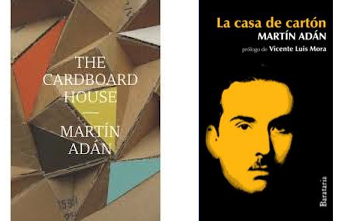Martín Adán's 'The Cardboard House'
The poet's novel

Martín Adán’s The Cardboard House — this text is exactly what I imagine when I ponder the question, what is a “poet’s novel?” It could be called a novel. It could also be called a suite of prose poems. The language is both precise and conjuring.
“The sun: a rare, hard, golden, lanky coleopteran.” [1]
Coleoptera, or beetle, from Greek, meaning “sheath” and “wing” sums up nicely an aesthetic approach I am trying to locate within the larger realm of the form. Poet’s novels are somehow sleek, narrowed, compressed, with a density akin to poetry, and also with the possibility of flight often more difficult to locate in prose. Prose fiction can be beholden to plots, turns, developments which must unfold. Not so with poet’s novels which defy categorization and move with the freedom of verse. In The Cardboard House, sun is a character, as is the afternoon, sky, boyhood, sea, cities, etc.
I knew I was well ensconced in this fluid concise text when I read:
“On Matti Street, the fig trees went quickly to sleep so they could get up early. At a window, a very old piano was dying of love, like the Duke of Hohemburd — pink bald spot, white sideburns — in one or another of Kallmann’s operettas.” [2].
The Cardboard House, the only book of prose by Martin Adán, written when he was only twenty years, old unfolds in pictures, lists, interior portraits, moments which capture the transformation from child to adolescent to adult consciousness. The city of Lima and surrounding countryside are central, enmeshed with notions of how a young person begins to understand identity linked with place, linked with culture linked with politics. There is an exquisite delicacy and delving in the prose — which veers associatively in many directions, yet remains fluid. In this book, description is never simply description.
Time is also a character in Adán’s lyric construction — both time as in continuance and as countenance. What are the reflections of the hour, the era, the future, a lifetime? How do we swim within it and what to make of the necessity to sometimes remove oneself from this mode of existing within what seems a dictated span or spell within a school or beneath a banner of authority? Who does anyone become from under a heavy mantle awakening to awareness of the fragility of light, or the limitations of an existence bound within a singular form? “Your heart is a horn prohibited by traffic regulations” [3].
1. Martin Adán, The Cardboard House, trans Katherine Silver (New York City, New Directions, 2012), 5.
The poet's novel